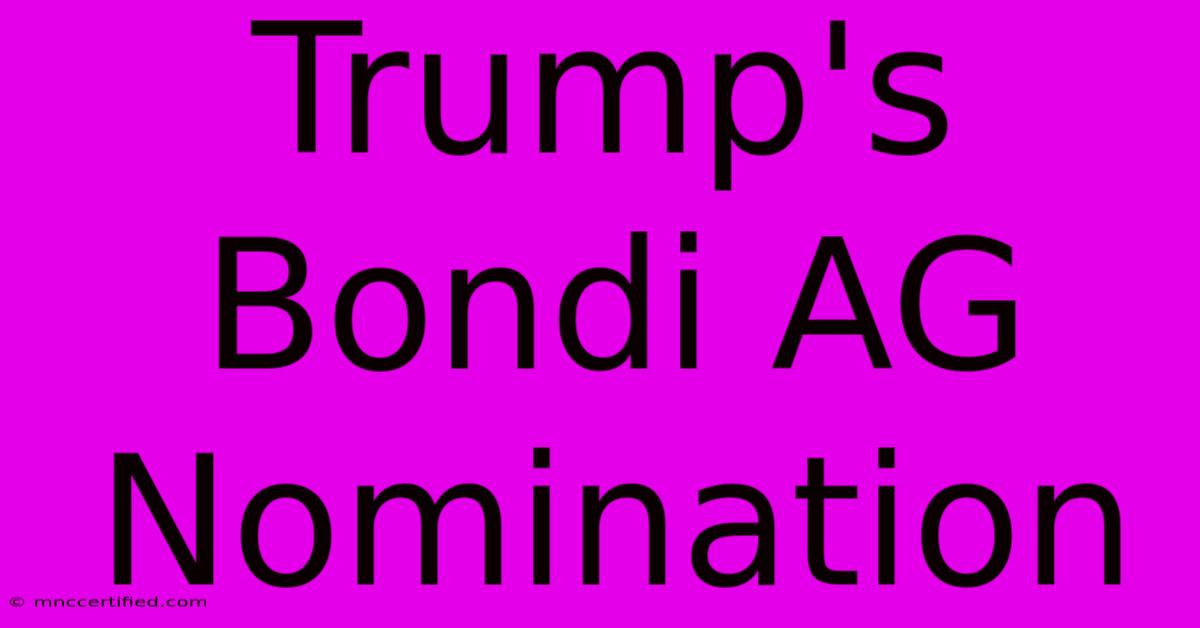Trump's Bondi AG Nomination

Table of Contents
Trump's Bondi Nomination: A Controversial Choice for Attorney General
Donald Trump's consideration of Pam Bondi as Attorney General sparked significant controversy. This article delves into the key aspects of this nomination, examining the reasons behind it, the ensuing criticisms, and its ultimate outcome. Understanding this episode offers valuable insight into the political dynamics surrounding Trump's presidency and the importance of ethical considerations in high-level appointments.
Pam Bondi's Background and Political Career
Pamela Jo Bondi, a Florida Republican, served as the 37th Attorney General of Florida from 2011 to 2015. Prior to her tenure as Attorney General, Bondi held various positions in Florida's legal system and Republican Party politics. Her career was marked by both successes and controversies, setting the stage for the intense scrutiny she faced during the Trump administration's consideration of her. Understanding her background is crucial to understanding the context of the nomination.
Key Accomplishments and Controversies During her Florida AG Tenure
Bondi's time as Florida's Attorney General included both notable achievements and considerable criticism. While she successfully prosecuted various cases, earning praise in some quarters, she also faced accusations of political favoritism and ethical lapses. These controversies, including allegations of accepting large campaign donations while simultaneously deciding not to pursue investigations against specific organizations, significantly impacted public perception and ultimately played a crucial role in the intense debate surrounding her potential appointment to a federal role.
The Nomination and the Subsequent Backlash
Trump's consideration of Bondi for Attorney General ignited widespread opposition. Critics pointed to several key factors driving their concerns:
- Campaign Donations: The most prominent criticism focused on the large campaign donations Bondi received from Donald Trump during her time as Florida's Attorney General. These contributions raised concerns about potential conflicts of interest and the appearance of quid pro quo.
- Lack of Extensive Federal Experience: Unlike many previous Attorney Generals, Bondi lacked extensive experience at the federal level. This lack of experience raised concerns about her preparedness for the complexities of the national justice system.
- Controversial Legal Decisions: Certain decisions made during Bondi's tenure as Florida's Attorney General were seen as politically motivated, fueling skepticism about her ability to serve impartially as the nation's top lawyer.
These concerns led to a significant public outcry, with numerous legal experts, political commentators, and civil rights organizations publicly opposing the nomination. The intense media coverage further fueled the controversy.
The Outcome and its Significance
Ultimately, Donald Trump did not nominate Pam Bondi as Attorney General. While the precise reasons behind the decision remain somewhat unclear, the overwhelming negative press and the potential for Senate confirmation challenges likely played a significant role. The failure of the nomination highlights the critical importance of thorough vetting processes for high-level appointments and the significant consequences that ethical concerns can have on political careers.
Lessons Learned and Long-Term Implications
The Bondi nomination episode serves as a case study illustrating the complexities of political appointments and the importance of transparency and ethical conduct in public service. The intense scrutiny surrounding the nomination underscores the public's growing demand for accountability from elected officials and high-ranking appointees. It also highlights the significant role of media scrutiny and public opinion in shaping the political landscape.
Keywords: Pam Bondi, Attorney General, Donald Trump, Nomination, Controversy, Campaign Donations, Conflict of Interest, Florida Attorney General, Political Appointments, Ethical Concerns, Public Scrutiny, Federal Government, Political Vetting.
On-Page SEO: The article utilizes keyword variations naturally throughout the text, employing header tags to structure the content, and focuses on delivering comprehensive information to address user search intent.
Off-Page SEO: Promoting this article would involve sharing it on social media platforms, obtaining backlinks from reputable news websites and political blogs, and engaging with relevant online communities and forums. Guest posting on relevant websites and participating in discussions on platforms like Reddit could also help increase the article's visibility.

Thank you for visiting our website wich cover about Trump's Bondi AG Nomination. We hope the information provided has been useful to you. Feel free to contact us if you have any questions or need further assistance. See you next time and dont miss to bookmark.
Featured Posts
-
Travel Insurance For Camera Gear
Nov 22, 2024
-
Reverend Richard Coles Net Worth
Nov 22, 2024
-
Bengals Steelers Pratts Week Victory Claim
Nov 22, 2024
-
Reverend Richard Coles I M A Celeb 2024
Nov 22, 2024
-
Miracle On Main Street Investing
Nov 22, 2024